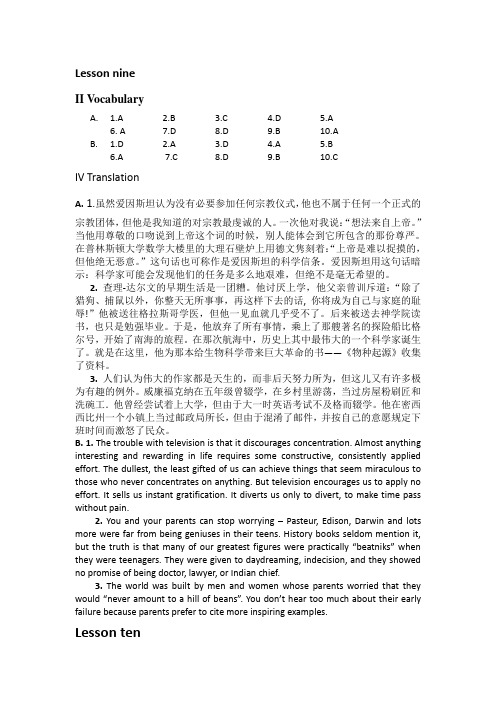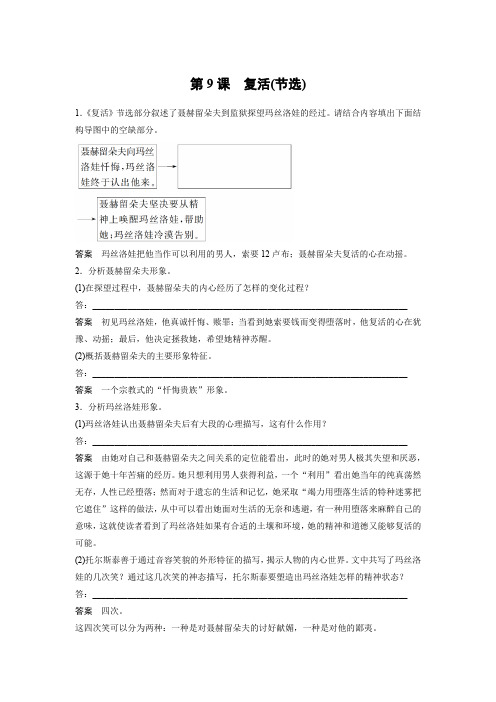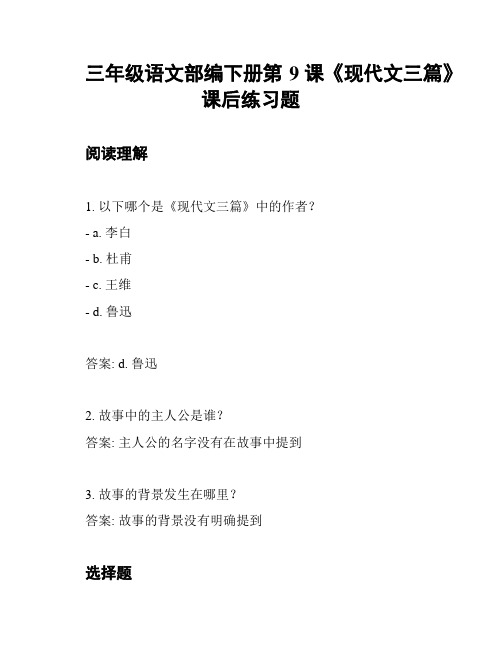新现西课后答案 第09课
Lesson9 10 12 13课后答案

Lesson nineII VocabularyA. 1.A 2.B 3.C 4.D 5.A6. A7.D8.D9.B 10.AB. 1.D 2.A 3.D 4.A 5.B6.A7.C8.D9.B 10.CIV TranslationA. 1.虽然爱因斯坦认为没有必要参加任何宗教仪式,他也不属于任何一个正式的宗教团体,但他是我知道的对宗教最虔诚的人。
一次他对我说:“想法来自上帝。
”当他用尊敬的口吻说到上帝这个词的时候,别人能体会到它所包含的那份尊严。
在普林斯顿大学数学大楼里的大理石壁炉上用德文隽刻着:“上帝是难以捉摸的,但他绝无恶意。
”这句话也可称作是爱因斯坦的科学信条。
爱因斯坦用这句话暗示:科学家可能会发现他们的任务是多么地艰难,但绝不是毫无希望的。
2. 查理-达尔文的早期生活是一团糟。
他讨厌上学,他父亲曾训斥道:“除了猎狗、捕鼠以外,你整天无所事事,再这样下去的话, 你将成为自己与家庭的耻辱!”他被送往格拉斯哥学医,但他一见血就几乎受不了。
后来被送去神学院读书,也只是勉强毕业。
于是,他放弃了所有事情,乘上了那艘著名的探险船比格尔号,开始了南海的旅程。
在那次航海中,历史上其中最伟大的一个科学家诞生了。
就是在这里,他为那本给生物科学带来巨大革命的书——《物种起源》收集了资料。
3. 人们认为伟大的作家都是天生的,而非后天努力所为,但这儿又有许多极为有趣的例外。
威廉福克纳在五年级曾辍学,在乡村里游荡,当过房屋粉刷匠和洗碗工.他曾经尝试着上大学,但由于大一时英语考试不及格而辍学。
他在密西西比州一个小镇上当过邮政局所长,但由于混淆了邮件,并按自己的意愿规定下班时间而激怒了民众。
B. 1. The trouble with television is that it discourages concentration. Almost anything interesting and rewarding in life requires some constructive, consistently applied effort. The dullest, the least gifted of us can achieve things that seem miraculous to those who never concentrates on anything. But television encourages us to apply no effort. It sells us instant gratification. It diverts us only to divert, to make time pass without pain.2. You and your parents can stop worrying –Pasteur, Edison, Darwin and lots more were far from being geniuses in their teens. History books seldom mention it, but the truth is that many of our greatest figures were practically “beatniks” when they were teenagers. They were given to daydreaming, indecision, and they showed no promise of being doctor, lawyer, or Indian chief.3. The world was built by men and women whose parents worried that they would “never amount to a hill of beans”. You don’t hear too mu ch about their early failure because parents prefer to cite more inspiring examples.Lesson tenII VocabularyA. 1.D 2.B 3.C 4.A 5.C6. D7.A8.D9.D 10.AB. 1.D 2.C 3.A 4.A 5.B6.A7.C8.D9.B 10.AIV TranslationSection A1.我把这种飞速增长的财富和不断萎靡的精神称之为“美国矛盾”。
现代西班牙语1册9课

现西第一册Lección 9今天咱表一表第九课,怎么一不小心变山东快书了?!不管它,还是照旧先看题目Pepe y Paco,原来是两个男人的故事,那我们就拭目以待,看看光天化日之下,他们....他们两个大男人能怎么着!Paco es paname?o.Pero ahora vive en China. Paco是巴拿马人,现在在中国生活.此处的vivir相当于英文的to live.Vive con su tío en una casa muy grande.他和他的叔叔一起住在一个很大的房子里。
还记得casa与familia的区别吗?对了,他们的区别就是英文house与family的区别.La casa tiene varios dormitorios,dos salas,dos cocinas y tres cuartos de ba?o.这所大house有很多屋子,两个厅,两个厨房,还有三个洗手间.有的同学可能会问此处为什么用tener而不用haber,原因很简单,拟人了呗.此外此处的vario等同于英文的various,而cuarto de ba?o是个固定的词组,洗手间(bathroom),望大家记住.Pepe,un amigo suyo,viene de Espa?a a verlo. 这句首次出现了重读物主形容词的用法之一,意为"他的一个朋友",这是和"uno de sus amigos"是不一样的,后者更强调"他的众多朋友中的一个".我希望大家能掌握课文出现的这种用法,现在大家巩固一下"我的一本杂志"怎么说:对了,una revista mía.那么"她的一些书"怎么表达呢?unos libros suyos,可千万别翻译成unos libros suyas,请大家记住:重读物主形容词也要根据它所修饰的名词来变化性和数! 一个不错的词组请大家记住venir de ....,从......来,相当于英文的come from,那么:"我从中国来"怎么说:Vengo de China.因为venir是个不规范的动词,最后一个问题viene de Espa?a a verlo.此句中的lo到底指谁?对了,是指Paco.如果此处考虑超过3秒,请复习第八课内容.Quiere pasar unos días con él.谁想和谁在一起度过几天呢?通过上下文我们知道Pepe从西班牙来到中国看望Paco,想和Paco在中国一起度过几天美好的时光.由于此句中querer是意愿动词,故后面直接接动词原形.它的意思更趋近于"想要......".我们举个例子:我想喝杯茶.就是:Quiero tomar(beber) un vaso de té.下面看对话部分:Paco:Pepe,estás en tu casa.Esa es tu habitación.Tienes una mesa,una silla y una cama. estás en tu casa多会说话啊,想当于汉语的"就跟在自己家一样啊",这个用法很客气,所以一定要记住.另外记住mesa与pupitre的区别,前者相当于table而后者是desk.Pepe:Muchas gracias.?Me puede dar unas llaves de la casa?您能不能把房子的钥匙给我啊?请大家尝试着把问句变成陈述句:对了,Me puede dar unas llaves de la casa ./Puede dar unas llaves de la casa a mí.Paco:Sí.Aquí las tienes.Con ésta grande abres la puerta de la casa y con la peque?a puedes abrir la de tu habitaciós tienes que guardar bien.Aquí las tienes.这个值得记住.相当于英文的Here you are.但要注意啊,因为上文说到的钥匙是阴性才用的Aquí las tienes.你用这把大的钥匙可以打开房子的门,那把小的呢是你房间的钥匙.你要保管好这些钥匙啊.Pepe:Sí.Las voy a guardar muy bien.Ahora.?qué vamos a hacer?好的,我会保管好这些钥匙的.现在我们去干什么呢?Paco:Comer.?Comemos ya?Después vamos a ver una película吃饭啊,不是还没吃饭呢嘛.吃完饭咱看电影去.有的同学可能会问为什么此处用的是原形的comer,其实他是在口语中省略掉了一部分,说全了应该为:Vamos a comer.Pepe:Bien.?Pero me esperas un rato?Voy al lavabo.好啊.等我会儿成吗?我去趟厕所. (esperar)un rato=un momento相当于英文的wait a minute. 等一会儿。
现西第三册课文讲解及答案

现西第三册课文讲解及答案现西第三册Lección 1【一】语法一.自复被动句1.特点①动词必须是及物动词,不及物动词不能形成自复被动句。
②主语(施事)和宾语(受事)为同一主体,通常是无生命物件。
③动词以第三人称形式出现,与受事主语保持―数‖的一致,并采取代词式形式,加代词se.2.与相近句子结构的区别①注意与第三人称自复动词的区别:首先判断动词是主动或是被动,其次区别主体是否有无生命。
②注意与无人称句的区别:无人称句主体是单数时形式等同自复被动句,即都是se+第三人称单数动词变位;而在主体是复数时,自复被动句为se+第三人称复数动词变位,而无人称句则没有前面的se。
按西语国家的习惯,用被动句频率要大大高于无人称句,因此若是单数出现在二者均可理解的通的情况下,优先考虑是自复被动句。
③注意与相互句的区别相互句结构为se+动词的第三人称复数,区别时首先看句子中是否带相互动词mutuamente,若无相互动词则可再按加―相互...‖或―被...‖翻译看是否语义通顺进行区别。
二.ser与estar组成的名词谓语句的区别1.ser的表语可以是名词或形容词,而estar的标语只能是形容词。
2.ser表示实物固有或常驻的性质,而estar多指临时的状态或某种变化的结果。
如:La muchacha es muy guapa这个女孩很漂亮。
La muchacha esta muy guapa hoy这个女孩今天很漂亮。
前者表示―一直很漂亮‖或―天生就很漂亮‖,而后者则表示―只是今天很漂亮,也许是经过了打扮才漂亮‖。
3.某些形容词放在ser或estar后含义不同。
如:El es listo他很聪明。
Todo esta listo 什么都弄停当了。
El es muy vivo他很活泼。
El todavía esta vivo他还活着。
【二】léxico词汇I.reunir(se)A.tr.聚集,汇集,积攒1.我(女)朋友想攒点钱买辆车。
新视野大学英语第二册Unit9课后答案和翻译(第3版)

新视野大学英语第二册Unit9课后答案和翻译(第3版)新视野大学英语第二册Unit9课后答案和翻译(第3版)导语:《新视野大学英语》以质量为保证,以特色求发展,以上一个新台阶为目标,积极应对高教大发展、教育国际化带来的`新挑战。
下面YJBYS店铺带来新视野大学英语第二册Unit9课后答案和翻译(第3版),欢迎大家前来学习。
新视野大学英语(第3版)第一册Unit9答案【Section A】Comprehension of the TextI.1. His mother. Because she influenced his thoughts and attitudes toward life.2. He learned from his mother that one should never quit.3. The family was homeless, jobless and penniless with three babies waiting to be fed.4. She quit school to find a job as a grocer and moved the family to live with her brother, Allen.5. She discovered in him a talent for words.6. Though very poor, she signed him up for a set of books for intermediate and advanced readers.7. He worked as a reporter with the Baltimore Sun and later with The New York Times. He won the Pulitzer Prize.8. No, she didn’t have the chance to know of it because her health collapsed, but she always believed in it.VocabularyIII.1.ambitious2.sympathize3.tender4.considering5.corruption6.scattered7.intermediate8.corresponding9.equivalent 10.deceivedIV.1.to2.around3.to/with4.up5.out6.to7.out8.of9.From 10.inV.1.J2.M3.F4.L 5,A 6.O 7.G 8.D 9.I 10.CWord BuildingVI.1. After working extra hours for several months, I have repaid the money to the bank.2. I didn’t enjoy the story at first, but I came to like it whenI reread it.3. He replaced the book on the shelf when he finished it.4. She is slowly regaining he strength after the accident.5. The old city center was redesigned after the war.6. She was asked toreconsider her decision to leave the job.7. After the disaster the government spent millions of dollars helping the local people to reconstruct their homes.8. The museum has such a fine set of old paintings that it is worth revisiting.VII.1. dishonest2. discouraged3. displeased4. discontinued5. disappearing6. discharged7. disclosed8. dislikeSentence StructureVIII.1. I’ve made up my mind to marry him even if my moth er objects.2. She has problems finding a job even if she gets a Bachelor’s degree.3. Even if you normally have good skin, some pats of the face may become dry during the winter.4. The young man felt great sadness even if he did not find the words to express it.5. Even if you don’t watch music programs, you’ve probably heard his songs.IX.1. The clearer a goal is , the easier it is to decide whether the goal is achievable.2. The angrier I got, the less he said.3. The larger the city is, the greater the increase in population is.4. The longer they stick to their goal, the greater the chances of success are.5. The more expensive the restaurant is, the better the food it serves.TranslationX.1. I am sure that I will make something of myself, even though I have not achieved any major success so far.2. I have been working hard for so many years; I feel I am entitled to a good future.3. When her husband deserted her, leaving her with nothing but scattered pieces of life to pick up, she went insane.4. From my standpoint, Mother was too hard on me then, without taking my feelings into account.5. When I reached the summit of my professional career, mother's words "Never be a quitter in face of life" were constantly in my mind.6. You should know better than to play football in the street.XI.1. 詹姆士是个诚实的人,尽管我反对他这个人,我还是要这样说。
20-21版:第9课 复活(节选)(步步高)

第9课复活(节选)1.《复活》节选部分叙述了聂赫留朵夫到监狱探望玛丝洛娃的经过。
请结合内容填出下面结构导图中的空缺部分。
答案玛丝洛娃把他当作可以利用的男人,索要12卢布;聂赫留朵夫复活的心在动摇。
2.分析聂赫留朵夫形象。
(1)在探望过程中,聂赫留朵夫的内心经历了怎样的变化过程?答:________________________________________________________________________答案初见玛丝洛娃,他真诚忏悔、赎罪;当看到她索要钱而变得堕落时,他复活的心在犹豫、动摇;最后,他决定拯救她,希望她精神苏醒。
(2)概括聂赫留朵夫的主要形象特征。
答:________________________________________________________________________答案一个宗教式的“忏悔贵族”形象。
3.分析玛丝洛娃形象。
(1)玛丝洛娃认出聂赫留朵夫后有大段的心理描写,这有什么作用?答:________________________________________________________________________答案由她对自己和聂赫留朵夫之间关系的定位能看出,此时的她对男人极其失望和厌恶,这源于她十年苦痛的经历。
她只想利用男人获得利益,一个“利用”看出她当年的纯真荡然无存,人性已经堕落;然而对于遗忘的生活和记忆,她采取“竭力用堕落生活的特种迷雾把它遮住”这样的做法,从中可以看出她面对生活的无奈和逃避,有一种用堕落来麻醉自己的意味,这就使读者看到了玛丝洛娃如果有合适的土壤和环境,她的精神和道德又能够复活的可能。
(2)托尔斯泰善于通过音容笑貌的外形特征的描写,揭示人物的内心世界。
文中共写了玛丝洛娃的几次笑?通过这几次笑的神态描写,托尔斯泰要塑造出玛丝洛娃怎样的精神状态?答:________________________________________________________________________答案四次。
现西第一册课文讲解及答案

现西第一册课文讲解及答案现西第一册Lecci?n 1西班牙语是相对于英语来说更严谨的一种语言,之所以这样说主要体现在如下几个方面:1.所有的名词均分为阴阳性,基本上以o结尾的为阳性,而以a结尾的为阴性,修饰名词的形容词要根据名词来变性。
2.动词需要根据主语的人称来进行相应变化,西班牙语中共有这样六组人称代词:1.我2.你3.他,她,它,您4.我们5.你们6.他们,她们,它们,您们,既然代词共有六组,那么相应的动词也同样需要6种变化(西班牙语中称之为动词变位),这在以后的课程中会逐渐讲到3.西语的字母发音相对比较单一,因此,我们可以通过单词字母的组成结构,读出其发音,好了,先讲这么多,下面我们开始看课文.我们首先看题目:?Qui?n es ?l?,看惯了英文,第一眼看上去,会觉得有些奇怪,没错,你说对了,第一个单词前面确实是一个倒过来的问号,这个是我们应该注意的第一点:1.西语的问句中有两个问号,问句前一个倒问号,问句结束后才是一个正问号。
2.不光问句如此,感叹句也是由两个感叹号组成,和问句一样,前面一个倒过来的感叹号,结束时是一个正的感叹号,如:?Qu? lástima!3.让大伙看不习惯的还有单词的小尾巴′,这个是西语中的重音符号.相信大家已经背过了单词,那么下面我们来看第一部分:1.él es Paco,Paco es cubano.这个句子是个典型的主谓结构,不难理解,但这里面有我们需要掌握的东西,那就是这里面已经体现出上面所谈的西语名词的性了。
通过词汇表我们知道cubano这个词是阳性的,那比如我们要说Maria 是古巴人怎么说呢,Maria es cubano,这个句子是不对的,因为Maria是女孩名字,那么自然是阴性了,所以cubano这个词要相应的变性,把最后的o变成a,所以正确的句子应该是Maria es cubana.记住了,要变性!2.él es Pepe,Pepe es chileno.这个句子和上面的句子构成模式完全一样,那如果现在要你说:Ana 是智利人,你会说吗?没错,当主语为Ana时,相应的名词chileno需要变性,把最后的o变成a,那么这句话应该是:Ana es chilena.3.第三句需要我们注意一下,因为它出现了se llama这个结构,词汇表解释为:它,他,她,您叫....,那根据这个我们不难翻译这句话:Ella se llama Ana.她叫安娜。
现代西班牙语第一册1-12课答案

附:课后练习II.1.Paco es cubano.2.Ana y Pepe son amigos.3.Ella es Ana.4.¿Quien es él?5.Son Ana y Ema amigas?Sí,ellas son amigas.2.课后习题VII.1.¿Son ellos amigos de Ana?No,ellos no son anigos de Ana .Son amigos de Ema.2.¿Qué es Lucía? Es enfermera.3.¿Es usted hermana de Paco ?Sí,yo soy hermana de Paco.4.¿Quién es cantante? Lucía es cantante.5.¿Eres cocinero? No,no soy cocinero.Soy médico.6.¿Lucía y Ema son hermanas.VIII.1.Ema es enfermera.Es esposa de manolo.2.¿Qué son ellos? Ellos son cocineros.3.¿Sois médicos? No,no somos médicos.Somos enfermeros. 这里也可以全用阴性的词.4.Hola,¿usted es ....? (¿quién es usted?)Me llamo Zhang bin .Soy padre de zhang weinan.¡Hola!5.Estos dos son Paco y Li xin. Paco es chileno. Li xin es china.Ellos son amigos de Lucía.自我测试题(1--2课)VIII.1.¿Quiénes sois? (¿Quiénes son ustedes?)2.¿Qué es Paco? ¿Es médico?3.¿Quién es ella?¿Es hermana de Ema?4.Este es Manolo. Es cubano.Es cantante.5.Estos dos son Lucía y Pepe.Lucía es enfermera.Pepe es cocinero.somos amigos.6.¡Hola!Me llamo Li Xin.¡Hola!Me llamo Manolo.Este es Pepe.7.¿Es usted esposa de Paco?No,no soy esposa de Paco.(no soy su esposa)soy su hermana.2.课后习题V. la el la la el el las el la los las los lasVI.mi casa nuestra casanuestras casas el amigo tuyovuestra amiga vuestros hijosnuestros esposos sus esposassus hermanos (los hermanos de él) sus hermanos (los hermanos de ellos)su habitación su oficina(la oficina de ustedes)vuestros dormitorios nuestros camasel cuarto de Ana(la habi tación de Ana ) la mesa de Pacola casa de Lucía el tormitorio de de Lin xinel cuarto de nuestro padre la mesa de su hijala fábrica de nuestro amigo la oficina de nuestro padrelas camas de vuestros hermanos la oficina de su madre这道题的答案都不是唯一的.VIII. 1.En 2.El el de Su en el 4.sus(tus) 5.En de del de mi(su)X.Esta es mi casa. En ella hay una sala,una cocinay dos dormitorios.En la sala hay tres sofás y una mesa. Este es el dormitorio de mi hijo.En él hay dos camas. Yo soy funcionario.Mi oficina estáen el centro de la ciudad.课后习题VIII.1. la de Es En hay2. es maestro amable La de3. señora la de amable somos4. En un En el5. el es en de本题中第一个el似乎可以不用填单词的。
三年级语文部编下册第9课《现代文三篇》课后练习题

三年级语文部编下册第9课《现代文三篇》
课后练习题
阅读理解
1. 以下哪个是《现代文三篇》中的作者?
- a. 李白
- b. 杜甫
- c. 王维
- d. 鲁迅
答案: d. 鲁迅
2. 故事中的主人公是谁?
答案: 主人公的名字没有在故事中提到
3. 故事的背景发生在哪里?
答案: 故事的背景没有明确提到
选择题
1. 以下哪个是鲁迅的作品?
- a. 红楼梦
- b. 西游记
- c. 莎士比亚全集
- d. 狂人日记
答案: d. 狂人日记
2. 故事中的主人公最后给自己取了一个什么样的名字?
答案: 主人公的名字没有在故事中提到
问答题
1. 请简要概括《现代文三篇》中的故事主题。
答案: 故事讲述了一个人对于生活的困惑和心理变化,通过主人公的内心独白,探讨了现实与理想的冲突和人性的复杂性。
2. 你觉得故事中的主人公最大的改变是什么?
答案: 故事中的主人公在经历一系列心理冲突后,对于自己的生活产生了新的认知和理解,从而改变了以往的想法和行为。
以上就是三年级语文部编下册第9课《现代文三篇》课后练习题的答案。
- 1、下载文档前请自行甄别文档内容的完整性,平台不提供额外的编辑、内容补充、找答案等附加服务。
- 2、"仅部分预览"的文档,不可在线预览部分如存在完整性等问题,可反馈申请退款(可完整预览的文档不适用该条件!)。
- 3、如文档侵犯您的权益,请联系客服反馈,我们会尽快为您处理(人工客服工作时间:9:00-18:30)。
第九课UNIDAD LECCIÓN9
1.交际FUNCIÓN COMUNICATIV A
☆如何表示命令和祈使
2.语法GRAMÁTICA
☆宾格、与格人称代词同时使用;
☆命令式第二人称单数的亲昵式和礼貌式(I);
☆连接词si和条件从句
☆直接宾语从句;
☆动词短语VOLVER A+INF.
☆不规则动词ENCENDER,SABER和SEGUIR的陈
述式现在时变位;
☆动词DECIR,HACER,IR,PONER,SABER,
TENER,VENIR,VER的命令式变位
·练习EJERCICIOS
II.请为下列名词划分音节,然后将该名词变为复数,并添加定冠词(Primero, marque las sílabas de las siguientes palabras;después,ponga estas en plural y agregue,donde corresponda,los artículos determinados)
1.recepción las recepciones
2.dirección las direcciones
3.celular los celulares
4.taxista los taxistas
5.día los días
6.país los países
7.vez las veces8.ascensor los ascensores
9.turista los turistas10.autobús los autobuses
III.请听录音,口头回答关于课文的问题(Escuche las preguntas sobre el texto y contéstelas oralmente en español.)
s dos chicas se llaman Rita y Bella.
2.Bella tiene muchas ganas de ver a Rita porque llevan mucho tiempo sin verse.
3.Bella estáen el hotel Gato Negro.
4.Al invitar a Bella a casa,Rita le dice que hay suficiente espacio en su casa para
ellas dos.
5.Antes de ir a casa de Rita,Bella tiene que decir a la recepción que va a dejar el
hotel
6.Antes de darle su dirección,Rita le pide a Bella su número de móvil.。
